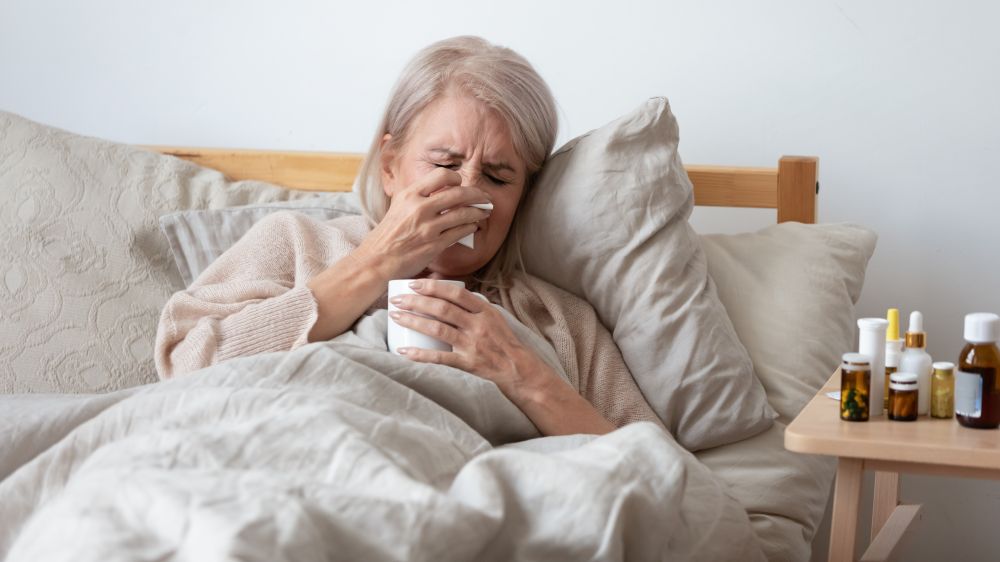Viral respiratory season occurs annually during the winter months in the United States. What many people call "flu season" actually involves a host of viruses, including influenza A and B. This season is unique because it's happening during a worldwide pandemic, when doctors and patients are already facing COVID-19. These compounding health care issues can be a concern for the average person, but for someone with cancer who may be going through treatment, it can be even more challenging.
It's important to take precautions during the current resurgence of COVID-19 amid cough, cold and flu season. Taking precautions is important for anyone to help stay healthy and not overwhelm health care systems, but is particularly important for people with cancer who may have a compromised immune system.
Steps to help protect everyone
We know COVID-19 is a respiratory droplet infection so the places where there are the highest chances of spreading these droplets is indoor crowded places where people are eating and talking, without wearing a mask. Running to a grocery store, picking up your kids, going to a practice outdoors — as long as you're wearing a mask and being careful with social distancing and hand washing, the average person should be just fine.
Anyone can support their immune system by eating a balanced healthy diet, exercising and taking a vitamin D supplement. If there is low vitamin D in your body the ace 2 receptor expression is increased and that's the receptor where the COVID virus attacks your respiratory cells, so if your vitamin D is normal your ace receptors are actually going to be normal or low and you will be less prone to complications from COVID-19.
Another important step is getting a flu shot, which helps protect you against several strains of influenza. Physicians are concerned about people who have the flu and then contract COVID-19 because two respiratory viral illnesses simultaneously or concurrently are more challenging for the body to fight. What's more, by getting a flu shot you're being proactive in supporting your health so you don't get sick and potentially overwhelm the health care systems.
It's important to keep cases down and keep hospitalization to the minimum from anything that is preventable because hospitals can get overloaded. If a system is overrun they can't take care of other patients — such as a traffic accident patient or someone with appendicitis or someone having a heart attack — because there are no beds.
Additional steps for people with cancer
At Minnesota Oncology, we highly recommend our patients to get a flu shot. Do not get the Flu mist, as it contains the live virus. Follow all the precautions your health care team is recommending specific to your cancer treatment. Exercise, get adequate sleep, eat healthy and take Vitamin D.
It's important to stay in tune with how you're feeling, stay aware of any new symptoms or notable changes in how you are feeling. It might be nothing, but it might be the start of an illness that needs close attention. Pick up the phone and call us because we as your oncology providers are always available for you.
Additionally, some people with cancer may require special exemptions from going to work because they are considered high risk for COVID 19 complications. For example, if a school teacher is going through chemotherapy, it's best for her to avoid in person classes and just use distant learning.
The good thing is that for people who completed treatment, in remission and haven't been exposed to chemotherapy or radiation therapy in the last 3-6 months, the immune system is normal. This also includes breast cancer patients who are on oral medications that are hormonal blocking drugs and not considered chemotherapy.
As for holiday gatherings, COVID-19 is not going away so you have to find a middle ground.
The Centers for Disease Control has clear guidelines for the holidays. They recommend celebrating with your own household only. At this point in time, COVID-19 is spreading from small family gatherings. And if you have certain families already in your quarantine bubble, who have the same philosophy as yours regarding COVID precautions, you can consider meeting them in person although the safest bet is to keep the party size as small as possible.
Avoid large gatherings as they are extremely risky. This is time to be creative. Consider packing lunch boxes and celebrate a drive-through Thanksgiving. Hold Zoom meetings and share a meal virtually, as there are alternative ways to celebrate with the loved ones while keeping everyone safe.
Uzma Ali, MD, is a medical oncologist and hematologist at Minnesota Oncology's Fridley Clinic.




